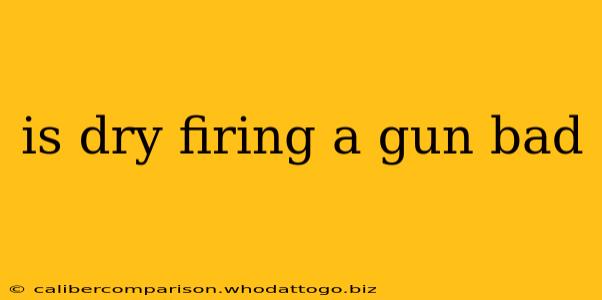Dry firing, the act of pulling the trigger of a firearm without live ammunition, is a practice with both benefits and potential drawbacks. Whether it's "bad" depends entirely on the firearm and how it's done. This comprehensive guide will explore the nuances of dry firing, helping you understand when it's beneficial and when precautions are absolutely necessary.
Understanding the Risks of Dry Firing
The primary concern with dry firing stems from the potential damage to the firearm's firing pin. When a firing pin strikes a hard surface (like the breech face in a cartridge-based firearm), repeated impacts can lead to:
- Firing Pin Damage: The firing pin can become damaged or broken, requiring costly repairs or replacement. This is especially true for older or poorly maintained firearms.
- Breech Face Damage: In some firearms, the repeated impact can also damage the breech face itself, impacting the firearm's accuracy and functionality.
When Dry Firing is Safe and Beneficial
Despite the potential risks, dry firing can be a valuable training tool when done correctly. Here's when it's safe and beneficial:
- Developing Proper Trigger Control: Dry firing allows you to practice trigger control without the added complexities and cost of live ammunition. Consistent, smooth trigger pulls are crucial for accuracy.
- Improving Grip and Stance: You can focus on proper grip, stance, and sight alignment, developing muscle memory for consistent shooting form.
- Safe Practice in Restricted Environments: It's a safe way to practice in locations where live fire isn't permitted.
- Affordable Practice: It significantly reduces the cost of training compared to using live ammunition.
Firearms That Can Be Dry Fired Safely
Most modern firearms are designed to withstand dry firing. However, it's essential to:
- Check Your Firearm's Manual: The owner's manual will explicitly state whether dry firing is safe for your specific model. This is the most important step.
- Look for "Dry Fire Safe" Features: Some manufacturers include features specifically designed to prevent damage during dry firing.
Firearms That Should Never Be Dry Fired
Certain firearms are particularly susceptible to damage from dry firing and should be avoided:
- Older Firearms: Older firearms with less robust firing pins are more prone to damage.
- Certain Rimfire Rifles & Pistols: Rimfire ammunition differs significantly and dry-firing can be particularly damaging. Always check your manual.
- Firearms with Specific Internal Designs: Some firearm designs have sensitive internal components that can be easily damaged during dry firing. Consult a qualified gunsmith if unsure.
Safe Dry Firing Techniques
If your firearm is suitable for dry firing, follow these safety precautions:
- Always Check the Chamber: Before any dry firing practice, visually and physically inspect the firearm to ensure the chamber is completely empty.
- Use a Snap Cap: A snap cap is a dummy cartridge designed to protect the firing pin from damage during dry firing. This is the safest approach for most firearms.
- Controlled Environment: Practice dry firing in a safe and controlled environment, away from distractions and potential hazards.
- Focus on Technique: Concentrate on proper technique and form rather than just pulling the trigger repeatedly.
When to Seek Professional Help
If you're unsure whether dry firing is safe for your specific firearm, consult a qualified gunsmith. They can assess your firearm and provide guidance based on its design and condition.
Conclusion: Responsible Dry Firing
Dry firing can be a valuable and safe training tool if approached responsibly and with awareness of the potential risks. Always prioritize safety by checking your firearm's manual, utilizing snap caps when appropriate, and performing a thorough chamber check before each session. By following these guidelines, you can reap the benefits of dry firing while minimizing potential damage to your firearm.

